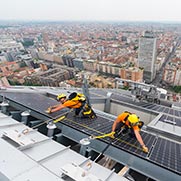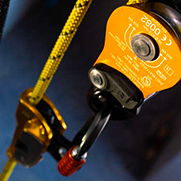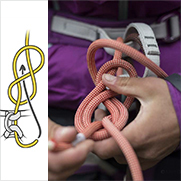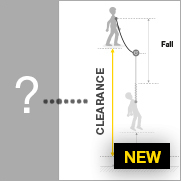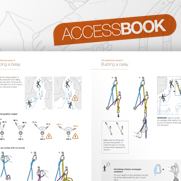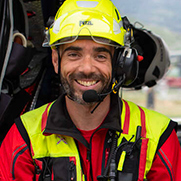Choice of lanyard-end carabiner for a fall-arrest lanyard
Warnings
- Carefully read the Instructions for Use used in this technical advice before consulting the advice itself. You must have already read and understood the information in the Instructions for Use to be able to understand this supplementary information.
- Mastering these techniques requires specific training. Work with a professional to confirm your ability to perform these techniques safely and independently before attempting them unsupervised.
- We provide examples of techniques related to your activity. There may be others that we do not describe here.
Key issues and risks
The fall-arrest lanyard is not under tension, but must be able to stop a fall at any time.
The carabiner must be easily attachable to various anchors, sometimes of large diameter, so its shape must be chosen with care.
The most important risks to consider
Recommendation on carabiner and accessories
- Use a carabiner shape suitable for the anchors you encounter
- Use a carabiner positioning system (STRING or plastic sleeve) or a directional carabiner
Good anchor placement and controlled situations
In most work situations, the anchors are planned and placed to limit risks in the event of a fall.
- Security of locking
- Speed of use
- Shape suitable for large-diameter anchors
Difficult anchors and situations
When the anchor placement does not allow for control over all potential rub points or bad placements, use carabiners that are certified to ANSI or CSA North American standards, which have locking sleeves with greater resistance to external pressure.
With the ABSORBICA TIE-BACK lanyard:
Be careful in selecting your lanyard-end connector. If the connector has a protruding nose, relative to the gate, the gate can snag on a textile part of the lanyard (intermediate attachment ring). So there is a risk of the lanyard disconnecting in the event of a fall while wrapping a beam.
Usage precautions
- Beware of the position of the carabiner in the anchor and of possible external pressure situations around the anchor that can produce cantilever loading.
- When clipping, check that the carabiner is correctly positioned in the anchor, and that the sleeve is completely locked.
- Plan your movements during use to anticipate the movement of the carabiners and the risks of poor positioning.
- Use a locking system suited to your frequency of connection/disconnection.
Notes
The SL manual locking system can be used, specifically in dirty environments (mud, sand...), taking into account the risk of the sleeve opening in use and the risk of forgetting to lock the sleeve at each connection.


